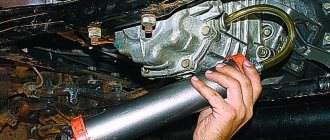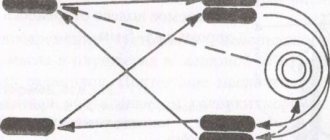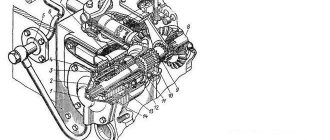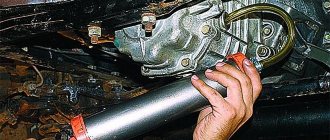Any car will work properly if it is regularly and properly maintained. Working at a service station, I often come across the fact that Gazelle drivers, for some reason, do not consider it necessary to provide the car with consumables such as engine oil or transmission fluid.
The most they do is periodically add lubricant to the system, believing that for a “workhorse” this will do. Such actions are fundamentally wrong, since it is also necessary to fill the Gazelle’s gearbox with oil.
There are other problems that arise for owners of such vehicles. Often, the car enthusiast simply does not know what kind of oil to pour into the Gazelle box and how much such fluid is required. This point is very important, since the slightest overfilling or underfilling of the substance can lead to problems with the performance of the car.
Oil selection
The gearbox oil purchased for replacement must be of proper quality.
Factors to consider when choosing oil:
- instructions from the manufacturer regarding the characteristics of the lubricant for the gearbox of a specific vehicle modification;
- operating conditions of the vehicle;
- The volume of oil purchased must exceed what is poured into the box by at least 0.5-1 liter. This excess will be needed for possible addition of fluid during operation.
The climatic conditions in which the vehicle is operated plays a serious role when choosing a lubricant, since the degree of viscosity of the selected material depends on this.
In some cases, the manufacturer does not bother with recommendations regarding certain lubricant characteristics, but only indicates which standard the transmission fluid must meet. Most often this is SAE 75W.
The following oils can be recommended from proven products:
- Castrol 75W140;
- Mannol 75W80;
- TNK Magnum Trans Gipoid Super 75W90.
This is not a complete list, however, you will be quite satisfied with any of the listed products.
The characteristics of transmission fluid meeting the SAE 75W standard are improved thanks to mineral additives. Due to the fact that a change in the viscosity of such a lubricant occurs when the temperature drops to -45˚ C, it can be used even in the coldest regions.
This is interesting: A guide to removing the instrument panel on a GAZelle Business and a description of the icons - let’s look at it carefully
It is important to correctly determine
The unit, filled to the technological level with recommended oils, ensures stable, long-lasting operation of the gearbox. In particular, the sable refers to the domestic car. Drivers constantly monitor the oil level in the gearbox. Read the instructions and find out what type of lubricant to use.
As for domestic cars, for example, the volume of oil required in the Gazelle gearbox is filled in accordance with the operating instructions for the transmission unit. For modifications 2705, 406, 3302 and so on, use Next lubricant. Change every 60 thousand kilometers.
Since the car is operated all year round in less than ideal weather and road conditions, constant control over the quality of the oil used is necessary. Check for metal debris and loss of lubricating properties. Increased performance requires an oil change.
Typical faults
The most common gearbox malfunctions are the following:
- speeds do not change; when switching, a sound similar to a metallic crunch occurs;
- difficult transition between gears;
- when the car is overloaded, the active gear “flies off”;
- “sticking” of one speed, impossibility of switching to neutral;
- noise from the gearbox while the car is moving;
- At idle, a noise is heard, but when the clutch is pressed, it disappears;
- leaking crankcases.
The causes of such breakdowns are most often faulty parts that need to be replaced. Here is a list of the most common causes of breakdowns:
- cracking occurs due to wear of single teeth, chipped gears;
- breakage of teeth in the gear block;
- constant friction of the shift forks;
- wear of shafts and bearings makes it impossible to change gears;
- seals are broken;
- the oil has run out or has become unusable.
Repair of gearboxes of small Gazelle and medium GAZ trucks
Very often, the first thing that is detected is interference with the gearbox. Repair of the Gazelle gearbox is required if the following problems arise:
- extraneous noises when shifting gears or while driving;
- shifting has become tighter;
- reverse gear falls out;
- At idle, you can also hear some extraneous noise that disappears when you press the clutch;
- transmissions stop turning on.
All these alarming signs mean that it’s time to go to a car service center, put the car in the hands of an experienced technician who will carry out diagnostics, determine the “sore spot” and the necessary types of repairs.
The reasons for the malfunction of the Gazelle gearbox can be different:
- natural wear and tear of gearbox parts;
- current seals;
- low oil level in the gearbox;
- clutch failure;
- improper or excessive use of the truck.
Experienced drivers know well that regular preventive maintenance will help avoid breakdowns, and they contact a car service center without waiting for symptoms of a gearbox malfunction to appear. Timely replacement of oil, consumables and other preventive maintenance means no vehicle downtime and savings on repairs. You shouldn't let your workhorse have to replace the box if you can prevent it.
Algorithm for checking and changing oil in Gazelle
Check the lubricant level of the Gazelle gearbox as follows:
- Clean the filler neck from dirt;
- Use a clean rag, wiping the crankcase locations adjacent to the breather with it;
- Turn the lid a certain number of times.
In cars of this modification, there are several ways to check the oil level. It is easy to verify whether there is a lot or a little of it in a car that has driven 20 kilometers before the control. To check, the car is driven onto an overpass so that the car is only in a horizontal position. There should be no slope. Wait until the oil drains from the walls into the crankcase.
Unscrew the plug and observe the channel. If it starts to flow in a thin stream, then this is a signal that the level in the crankcase is lower. In this case, a syringe is used. With its help, a lubricating fluid is added and observed again. If the leak stops, this means that the oil level is normal. Afterwards the plug is screwed in. The process lasts 20 minutes. Maybe more if the check is carried out not on an overpass, but on a car inspection hole dug with your own hands.
The procedure for oil “improvement” of the transmission unit will require the preparation of tools. A bucket for draining waste liquid will come in handy. Syringe for adding lubricant. A rag and a can of new lubricant.
Operating a vehicle with a critical level of lubricant is strictly prohibited. Normal gear shifting will be complicated, and subsequently the gearbox may fail. A low oil level can create air barriers (plugs), causing a shortage of lubricant for gears and bearings.
Experienced drivers are able to detect underfilling of oil fluid by the noise of the box. But in order to have such experience and professional flair, you need to spend many hours behind the steering wheel of a car.
Which oil to choose
It should be understood that it is strictly forbidden to pour any transmission oil into the box. Each gearbox needs to be filled with oil with certain technical characteristics specified by the factory. Manufacturer's recommendations can be found by turning the pages of the technical manual. It is clearly stated here which oil is best to fill in the Gazelle gearbox. It is recommended to choose oil brands that are marked with SAE 75W viscosity. Do not skimp on purchasing gearbox oil, because when the air temperature rises or falls, the transmission fluid can undergo significant changes, preventing the gearbox from rotating the crankshaft normally. Most car owners prefer to pour Castrol 75w-140 or Total 75W-80 transmission fluid into the Gazelle box. We also recommend that you choose this kind of oil.
What is needed for replacement?
To change the oil, you should purchase the necessary tools:
- three-liter container for collecting waste liquid;
- new gear oil;
- a large syringe with a tube from a dropper or a special oil syringe to fill the liquid;
- a small amount of clean rags to remove dirt and grease residue.
Just in case, you can purchase flushing material to clean the gearbox if necessary.
Which oil is better to choose?
In the gearbox of the above car, the transmission fluid does not change as often as in the engine. The manufacturer recommends that consumers change the fluid less frequently than once every 4-5 years or every 75 thousand km, whichever comes first. According to Gazelle car owners, it is better to replace the fluid every four years or more often, or once every 60 thousand kilometers. In practice, the fluid in the gearbox deteriorates and loses its properties more often, so experts recommend replacing the fluid more often than recommended during operation and undergoing many tests. And the gearbox itself very often suffers from this. This unit has a particularly difficult time when the car owner fills in a product that is of poor quality or does not meet the technical parameters.
So which oil is best to choose for your Gazelle? This question was probably asked by every happy owner of a Gazelle car. And not in vain, because the optimal operation of the unit depends on the properties and characteristics of the TM in the gearbox. Unfortunately, the car manufacturer does not give clear recommendations on which brand of TM should be filled. However, the instruction manual states that the fluid viscosity marking should be “SAE 75W”.
Gazelle car gearbox removed
When choosing a TM, several factors should be taken into account:
- First of all, these are recommendations from the specialists of the automobile concern. You should not ignore the recommendations. If experts advise pouring a TM with certain properties, then it is better to buy a more expensive TM.
- Even with a frozen TM, the car’s crankshaft will be able to turn the gearbox shaft, but the gearbox itself will definitely not be able to turn the axle, so the fluid must be resistant to negative temperatures.
In practice, most car enthusiasts fill their cars with “Total 75W-80”. The latter brand of fluid is the most common when purchasing for replacement. This TM is mineral and has the following technical characteristics:
- the viscosity indicator at an engine operating temperature of 100 degrees is 8 mm2/s;
- the viscosity indicator at an engine operating temperature of 40 degrees is 49 mm2/s;
- the density of the consumable material is 877 kg/m3 at a temperature of 15 degrees;
- the pour point of the liquid is -45 degrees Celsius ambient temperature;
- the ignition temperature of TM is 208 degrees.
Choosing a lubricant
The smooth functioning of the gearbox, as well as the timing of replacement, largely depend on the quality and characteristics of the engine oil.
In the video from user Mechanic, you can learn more about choosing transmission fluid for a GAZelle car.
When choosing a lubricant for a GAZelle gearbox, you should take into account the following factors:
- Recommendations of the machine manufacturer for lubricants, which require certain requirements. It is best to use more expensive and high-quality oils, since by saving money on lubricants, you can spend a lot on repairing the unit.
- When choosing a brand of oil, it is necessary to take into account not only the operating conditions of the car (ambient temperature, road surface condition, total mileage), but also the manufacturer of the transmission fluid, as well as its reputation in the automotive market.
- You should purchase a “transmission” that is approximately 1 liter more than what is required for replacement. It will be needed later when topping up, and you only need to add the oil that was filled in earlier.
When choosing an oil, a lot depends on the climate in which the car is operated. In areas with low air temperatures, a liquid of lower viscosity is poured for the winter than in the southern regions.
Important Characteristics and reviews of owners of German-Chinese chainsaws of the Gardenlux brand (Gardenlux)
Car service books do not always contain recommendations regarding lubricant. For example, the operating instructions for a car with a UMP engine do not give specific instructions on the choice of oil; only a viscosity that meets the SAE 75W standard is recommended.
The following brands of oil correspond to these indicators:
- Castrol 75W140;
- Magnum 75W80;
- Total 75W80;
- Manol 75W80.
Cummins gear oil has also proven itself to be good, and is poured even into the boxes of business-class cars.
The presence of mineral additives in lubricants that meet the SAE 75W standard improves their characteristics, including density and viscosity. Such oils harden at a temperature of about -45°C, which allows them to be used in almost all regions of the Russian Federation.
Filling volumes of Gazelle oils (UMZ-4215, -4216, ZMZ 402, 405, 406)
| Refueling or lubrication point | Quantity, l | Name of materials |
| Fuel tank(s) | 70 (60) or 140 | gasoline AI-91, AI-93, AI-95, A-92, A-76**, AI-80** |
| Engine cooling system, including interior heating system | 9,7(11,5)* | TOSOL A-40M, OZH-40 “Lena”, TERMOSOL A-40 |
| Gearbox housing | 1,2 | “SuperT-3”, “Ufalub”, “Unitrans”, TSp-15K |
| Hydraulic brake system | 0,52 | Brake fluid "Tom", "ROSDOT" |
| Hydraulic clutch release system | 0,2 | Brake fluid "Tom", "ROSDOT" |
| Washer reservoir | 1,5 | Windshield washer fluid |
| Steering gear housing (without power steering) | 0,55–0,6 | "Super T-3", "Ufalub Unitrans" |
| Rear axle housing | 2,2 (3,0)*** | "Super T-3", "Ufalub Unitrans", "Devon SuperT" |
* For vehicles with additional heater.
The release of a new crossover from the world-famous Volkswagen concern did not go unnoticed in the automotive world: both experts and fans of the brand were eagerly waiting for the manufacturer to talk about the cost of the new product and its technical characteristics.
Advantages of a truck as a vehicle for large cargo transportation in Moscow and throughout Russia. The most popular type of truck for large cargo transportation is considered to be trucks that can hold 10-20 tons of cargo.
What is especially important in business is to ensure the preservation of the product, taking into account all its qualities and future functions. But since not everyone is able to organize appropriate conditions and special equipment for warehouses, the best solution should be considered the transfer of one’s own goods for safekeeping.
What services are offered to motorists at the service station?
Source
Replacement instructions
If the required volume of transmission oil for replacement has been prepared and the location for the operation has been selected, then you can change the “transmission” in the box.
Required Tools
To replace you should prepare:
- container for collecting “working off”;
- a syringe for pouring new lubricant;
- cleaning material;
- new oil to fill.
In some cases, flushing the gearbox housing will be necessary. This will be indicated by the presence of metal shavings on the drain plug magnet. Then you should additionally prepare approximately 1 liter of flushing oil.
In the video from the channel Gazelists of Ukraine you can watch about changing the lubricant in the Gazelle gearbox.
How much lubricant to pour and what is needed to change
The next question that you may have actually causes difficulties for many Gazelle owners, since the manufacturer itself is silent in the technical documentation and does not specify how much oil is poured into the gearbox. It is for this reason that some car owners decide to purchase a certain amount of oil at random from the Gazelle gearbox. Unfortunately, this is not a good practice, because during the replacement process there may be a shortage of transmission fluid, as a result of which you will not be able to successfully complete the process. It would also be unwise to purchase a large amount of oil in reserve, since in this case you will have to incur serious financial losses. Depending on the modification of the vehicle, you may need 1.6 - 1.8 liters of transmission fluid.
In particular, prepare:
- a set of keys;
- syringe for filling lubricant;
- acetone;
- rags;
- a container in which you can collect waste;
- diesel fuel or kerosene.
Now we will assume that you have successfully prepared for the upcoming procedure, so you can begin practical actions.
How much oil will you need?
The transmission fluid level should be monitored every 20 thousand km. If the oil level is low, add oil immediately. The volume of lubricant required for the Gazelle gearbox can vary depending on the modification, ranging from 1.2 to 1.6 liters. When purchasing lubricant, it is advisable to choose a 2-liter container so that some of the oil remains in stock.
IMPORTANT!!! It is extremely undesirable to operate a car with a low level of lubrication in the gearbox, since it can cause oil starvation of the gearbox elements, which can lead to their rapid wear.
Replacing the rocker spring
Firstly, I’ll warn you, it’s better not to do this, but to replace it with a complete house, they seem to cost around 1 thousand rubles. But the harsh Volgovods are not looking for easy ways. The reason why I came here was that the gearshift lever moved towards 1-2 gears much more easily, to the right, towards fifth gear. I thought it was the spring that was weak.
I drilled out the plug and picked it out:
I checked out the old spring and did not find any fundamental discrepancies:
Further, carefully examining the house, I realized that different forces are specified structurally, the springs are initially compressed differently:
Well, of course, I disassembled the wrong side that I had planned. When reassembling, the new plug did not want to come unraveled and the body did not want to open up. I had to counter it with stainless steel wire and cover it with glue:
How the box works
GAZelles are equipped with 4- or 5-speed manual transmissions. Components of the device:
- 2 aluminum crankcases connected by 100 bolts;
- speedometer drive gear;
- primary and secondary shafts connected to the cardan and crankshaft;
- an intermediate shaft on which the cut reverse and 1st stage teeth are located;
- pressed gear block;
- inertial synchronizers;
- reverse gear is provided by a gear block;
- clutch for engaging 3rd and 4th gears;
- system for blocking simultaneous launch of several speeds;
- spring-loaded balls for fastening different levels of the box;
- mechanism of the damper device of the lever and control elements.
The design of the unit allows for timely diagnosis of the first signs of malfunction to prevent more dangerous failures.
Specifications
Key characteristics of the gearbox of GAZelle cars:
- 4- or 5-speed transmission;
- 5 speeds - 1 reverse and 4 forward.
For the transmission, the following parameters can be noted:
- three-way lever located in the assembly;
- the mass of the part is 56 kg;
- oil tank capacity - 3 l;
- gear ratios for five stages - 6.55; 3.09; 1.71; 1; 7.77.
- The fourth stage in the gearbox is direct.
Basic models of the device assume the presence of synchronizers in the mechanism to ensure reliable operation.
Gear shift diagram
The gear scheme on the GAZelle is distinguished by the presence of a synchronizer. Moving the lever from the neutral position to the left side causes its lower part to move the shift rod and fork. This causes the first stage gear to move backward and come into contact with the first gear element located on the intermediate shaft. When the clutch is running, torque is transmitted through gears and intermediate elements to the secondary shaft.
The inclusion of the third speed is due to the movement of the lever from the neutral position, first to the right side, and then forward. Under the influence of the fork, the clutch begins to move backwards and the structure impacts the synchronizer. The torque follows in the direction of: the input shaft, the permanently meshed gears, the intermediate and secondary shaft of the gearbox.
To start the fourth speed, you will need to move the selector to the right and back relative to neutral. The forward movement of the clutch helps to engage the synchronizer locking ring with the input shaft. After balancing the speeds, gears are engaged. Reverse speed is started by moving the lever to the right after overcoming the resistance of the safety system.
The synchronizer is a mechanism in the form of a hub mounted on the secondary shaft of the box. The coupling moves along the splines located outside under the influence of the fork. Other key elements of the synchronizer:
- retaining springs;
- "blocking" parts;
- side bronze rings for locking the mechanism;
The work of the synchronizer is involved in engaging 3rd and 4th gears and is expressed in ensuring a smooth transition from one level to another.
How much oil to fill
Before changing the oil in the 5th mortar, it is necessary to check the current level. It is recommended to carry out such an action every 20,000 km. If there is enough oil in the gearbox, fluid is added to the crankcase.
The technical documentation does not contain data on the required amount of oil in the GAZelle box. The figure varies depending on the modification of the equipment, ranging from 1.2-1.6 liters. During work, the mixture is poured into the hole with a syringe until oil flows out of it.
GAZelle Next, GAZelle Business and other modifications of the car cannot be started with a low level of oil fluid. Small volume is the cause of air pockets, which have a negative impact on bearings and other elements of the gearbox.
About the order of the operation
We found out how much oil is in a GAZelle box, let's talk about how to replace it. This operation is carried out only on a warmed-up car gearbox, as this allows the “working off” to be completely drained.
Next, the procedure will be as follows:
- The machine is installed on an inspection pit or overpass. Stops are placed under the wheels.
- Thoroughly clean the drain and filler caps from accumulated dirt.
- Unscrew the drain plug, having previously placed a container under the crankcase to collect the “working off”.
- Drain the grease; this will take about 20 minutes.
- The drain plug is inspected for the presence of metal shavings. If it is noticed, you should flush the gearbox housing.
- The cleaned cap is screwed back into place and the filler is unscrewed. Depending on the vehicle configuration, it can be located on either the left or right side of the gearbox.
- Add the required amount of lubricant to the open filler hole using a syringe. Continue pouring until oil flows out of the hole.
- The plug is wiped and replaced.
If you don’t have a syringe at hand, you can change the oil without it. In this case, new lubricant is poured through the hole for the gear shift lever. Dismantling it will not be difficult. To do this, remove the protection in the form of a cover, and then turn out the lever. The required volume of liquid must be poured into the resulting hole in the crankcase, observing its appearance in the control hole.
The more gearbox stages, the more often the oil should be changed
The practice of operating and maintaining cars of this Gazelle brand shows that the more often the driver switches gears, the more intensively the fluid poured into the gearbox becomes clogged. No matter how effective the lubricating film covers the gears rubbing against each other, abrasive contact is still created, filling the oil structure with microscopic metal shavings.
The atomic oil loses its original viscosity, darkens, and performs its intended function less effectively. The main thing here is not to lose vigilance, but to promptly add lubricating fluid to a specific level or replace the oil if it does not meet the standard parameters in terms of lubricating characteristics.
Changing the gearbox lubricant yourself
Before you start directly replacing the transmission oil in the Gazelle box, you will need to warm up the unit to make the oil fluid more fluid. Start the engine and let the Gazelle run for a few minutes. If you don’t want to just waste time and waste fuel resources, then take a ride in a car and solve some of your pressing problems. After this, drive the Gazelle into the hole and use a hexagon to unscrew the drain plug.
Oil will immediately begin to flow out of it, so make sure that you can immediately place a container into which the old oil will flow. This process will take about half an hour, you still won’t be able to speed it up, so find some other activity during this time so as not to get bored. After the waste has drained, inspect it carefully. If you notice traces of metal shavings in it, then you will need to resort to flushing the gearbox. There is nothing complicated in this procedure. Just screw on the drain plug and, on the contrary, unscrew the filler plug. Using a filler syringe, pour about one liter of oil and 300 g of diesel fuel into it; by the way, it can be replaced with kerosene.
Important Design and technical characteristics of the L-34 front loader
Next, start the engine, engage first gear and let the engine run for a few minutes. Don't forget to put something under the front wheels. After this, we repeat the draining procedure, which will last about fifteen minutes. We tighten the drain plug and pour new oil through the filler hole. To allow it to spread well throughout the unit, we recommend not just driving the car at idle, but driving it for a certain distance. At the end of the trip, check the transmission fluid level. If you suddenly find that the level has dropped, then simply add a small amount of oil.
So, we hope that the process of replacing transmission fluid will not cause any particular difficulties, even if you do everything yourself. Concentrate and strictly follow the recommendations, in this case you will definitely succeed.
Step-by-step instruction
The oil change is carried out only on a warmed-up gearbox, since only in this case can almost all the waste be drained.
Your further actions will look like this:
- the vehicle is installed on an overpass or inspection hole and is additionally secured with special stops;
- the drain plug is cleaned of existing dirt, and at the same time we clean the area near the filler plug;
- Using a 12mm hexagon, unscrew the drain plug, under which the prepared container should first be installed;
- It will take at least 30 minutes for the liquid to completely drain;
- if the waste contains a small amount of metal shavings or is too dark in color, the gearbox should be washed with pre-purchased flushing material;
- after this, the drain hole should be tightened and the filler plug should be unscrewed;
- using a syringe, fill the box with the required amount of lubricant corresponding to the modification of your Gazelle;
- after the liquid is filled in, screw the filler cap into place;
- To complete the process, you need to drive the car and then inspect the gearbox for lubricant leakage. If this exists, all deficiencies should be eliminated immediately.
How to change and fill oil in a Gazelle box
Before starting work, prepare the required amount of oil in the Gazelle gearbox 5 tbsp, rags, a container for draining the treatment, keys with different heads. It is convenient to follow the video or regular instructions. Experienced drivers do not have any problems; for beginners, it is better to work according to the manual first; later, when your hand is full, you can do everything out of habit without strict guidance.
Changing the oil in a Gazelle Business box
Business is the most popular modification; it does not present any difficulties in maintenance. First, use a wrench to unscrew the bolts on the pallet. Then remove all the fasteners that hold the structure in place.
You need to move around the perimeter, performing all actions as carefully as possible
The next step is to dismantle the filter. If it is in order, it is enough to wash it and install a new element. The lubricant must drain, the process takes time, the main thing is to wait and not rush. Afterwards you will need to return the components to their place, and replace all the old thinned gaskets.
Before servicing the modification, Business prepares a complete standard set of tools
The work can be considered complete, but before driving it is worth checking the level in the system when cold and warm. Probably, after the gearbox warms up, there will not be enough lubricant, then top up.
Changing the oil in the Gazelle Next gearbox
The sequence of actions for servicing the Next gearbox must be followed:
Use a wrench or other tool to unscrew all the pallet bolts, proceed carefully so as not to damage anything. Remove fasteners around the perimeter. Unscrew the filter, rinse thoroughly, and if possible or necessary, install a new one. Give the grease time to drain - usually this takes up to 20 minutes. Return all parts to their place, replace rubber elements with new ones.
The work is completed, all that remains is to test the level. It is optimal to do this in two ways - before the engine warms up and after.
Changing the oil in the Gazelle Next Cummins gearbox
When the tools and materials are ready, take the keys and use them to unscrew all the bolts of the pallet. The fasteners are removed carefully and moved around the perimeter. The filter element is ideally replaced, at least washed and returned to its place.
The liquid drains for about 15-30 minutes. You need to let the lubricant flow out, estimate the volume, and then pour the same amount into the system. Afterwards, all working parts are returned to their place.
Important! At each regular maintenance, the gaskets are inspected - they need to be replaced.
Done - all that remains is to test the level and adjust it if necessary. Additional checks are required, since after the replacement is completed, adjustments are made in at least half of the cases.
During disassembly, all parts are washed and returned to their place.
Changing the oil in the box of Gazelle 3302
The last popular modification on the list is 3302. Use a wrench to unscrew the pallet bolts to carefully remove the structure
Sudden movements and jerks should be avoided - act with extreme caution. After removing the fastenings, they move around the perimeter as accurately as possible
The filter is replaced or washed, and the composition is allowed to flow out quietly. All suspicious, worn-out elements are replaced with new ones. At the end, they test the level, warm up the gearbox and check the amount of lubricant again.
There is no way to speed up the process of liquid leakage, you need to wait
When to change the oil in a GAZelle box and which gearbox oil to choose
So, as you know, the Gazelle has a seriously modified manual transmission from a Volga car. Considering that the Gazelle is a truck, while the Volga is a passenger car, without proper care, the gearbox on a Gazelle under load will quickly fail. Usually by 80 thousand km a gearbox hum appears, gears fall out, etc.
For this reason, high-quality oil is necessary, as well as regular oil changes at certain intervals. The oil change interval in the GAZelle box at the factory is 50 thousand km. mileage, however, practical operation shows that it is better to change the oil in a gazelle box every 25-30 thousand km. mileage. Only in the case of high-quality synthetics can the interval be increased to 40 thousand km. (taking into account that the operating conditions are gentle).
Having decided on the intervals, now let's look at which oil to choose for the GAZelle box. At the factory, a cheap version of TAD17 is poured into the gearbox. Such a lubricant can only be considered a break-in lubricant, that is, it is better to change it after 500-1 thousand km.
The manufacturer indicates that GL-4 oil with a viscosity of 75W-90 should be poured into this gearbox. You can also fill in GL-5 with this viscosity, but in this case problems with synchronizers may arise.
In practice, you should abandon the use of cheap mineral oils in favor of semi-synthetics or synthetics. First of all, mineral water gets stuck in winter, gears are difficult to engage before warming up, wear increases, and fuel consumption increases. It is optimal to choose high-quality semi-synthetics.
To understand how much oil is in a GAZelle box and how much it needs to be filled, it is not enough just to study the manual. The manual says 2 liters. However, in practice one should not exclude casting defects, different versions of the gearbox, etc.
It turns out that the volume of oil in a particular box can be either 1.2 or up to 1.5 liters. This means that for replacement you should immediately purchase 2 liters, since underfilling is a serious problem and will quickly damage the gearbox. Oil must be filled strictly according to the level of the oil filler plug.
This is interesting: Technical characteristics and maintenance of GAZelle Next (Next) of various modifications: we analyze it carefully
Answers (2)
The Gazelle Next gearbox and rear axle can be filled with semi-synthetic, mineral or fully synthetic gear oil. A universal solution would be semi-synthetic or synthetic 75W90 GL-4/GL-5.
For example, this is what the owners use:
Shell Spirax S5 ATE 75W-90 YOKO 75 W 90 TOTAL TRANS SYN FE 75W90 LIQUI MOLI GL4/GL5 75W90
In the bridge - 2.7 liters In the box - 1.5 liters.
Change at intervals of 80-90 thousand km, depending on operating conditions.
Hi all. The topic of today's article is oil in the gearbox of a gazelle car, how much to fill, how to change it and what oil to choose?
It so happened that the gazelle received a highly modernized box from a Volga car. It is important to understand that the Volga is a passenger car, and the Gazelle is a truck, which often works with overload and the gearbox is a consumable item. At least somehow extending the life of the box will help to use high-quality oil and adherence to its replacement interval.
How to change the oil in the gearbox of a Gazelle car?
We need a tool:
Hexagon 12 - we will use it to unscrew and tighten the drain plugs
Basin - we will drain used oil into it
Syringe - we will use it to fill in the oil, but if you wish, you can do without it.
Oil change procedure:
- We drive 10-20 km so that the oil in the box warms up and becomes more liquid.
- We drive into a pit or lift (or simply crawl under the frame as the height of the body allows)
- Unscrew the drain plug and substitute the basin
- We are waiting for the oil to stop draining
- We wipe the magnet of the drain plug from shavings and wrap it back.
- We unscrew the filler plug and fill in the oil with a syringe until it runs out of the filler plug.
- We wipe the threads and tighten the filler plug.
All the oil in the box has been changed and you can drive =)
If you do not have a syringe, you can pour oil into the box through the gear shift lever. To do this, remove the rubber cover and unscrew the lever itself (done by hand without tools, by hand).
Which oil is better to choose?
In the gearbox of the above car, the transmission fluid does not change as often as in the engine. The manufacturer recommends that consumers change the fluid less frequently than once every 4-5 years or every 75 thousand km, whichever comes first. According to Gazelle car owners, it is better to replace the fluid every four years or more often, or once every 60 thousand kilometers. In practice, the fluid in the gearbox deteriorates and loses its properties more often, so experts recommend replacing the fluid more often than recommended during operation and undergoing many tests. And the gearbox itself very often suffers from this. This unit has a particularly difficult time when the car owner fills in a product that is of poor quality or does not meet the technical parameters.
So which oil is best to choose for your Gazelle? This question was probably asked by every happy owner of a Gazelle car. And not in vain, because the optimal operation of the unit depends on the properties and characteristics of the TM in the gearbox. Unfortunately, the car manufacturer does not give clear recommendations on which brand of TM should be filled. However, the instruction manual states that the fluid viscosity marking should be “SAE 75W”.
Important The principle of operation and the difference between a crane beam and a hoist
Gazelle car gearbox removed
When choosing a TM, several factors should be taken into account:
- First of all, these are recommendations from the specialists of the automobile concern. You should not ignore the recommendations. If experts advise pouring a TM with certain properties, then it is better to buy a more expensive TM.
- Even with a frozen TM, the car’s crankshaft will be able to turn the gearbox shaft, but the gearbox itself will definitely not be able to turn the axle, so the fluid must be resistant to negative temperatures.
In practice, most car enthusiasts fill their cars with “Total 75W-80”. The latter brand of fluid is the most common when purchasing for replacement. This TM is mineral and has the following technical characteristics:
- the viscosity indicator at an engine operating temperature of 100 degrees is 8 mm2/s;
- the viscosity indicator at an engine operating temperature of 40 degrees is 49 mm2/s;
- the density of the consumable material is 877 kg/m3 at a temperature of 15 degrees;
- the pour point of the liquid is -45 degrees Celsius ambient temperature;
- the ignition temperature of TM is 208 degrees.
Assembly of the unit
This manipulation is performed in reverse order. After the necessary elements have been repaired or replaced, the shafts are simultaneously installed. To do this, it is advisable to connect them together with twine. Before starting assembly, you need to carefully inspect the crankcase for cracks, rust or other deformations.
First, all parts should be soaked in kerosene, any cracks and nicks should be sanded, all defective elements should be replaced, and lubricated with special oil. The crankcase fasteners must be treated with sealant, and the existing gaskets must be replaced. Experts recommend replacing bearings every 80-100 thousand kilometers.
Disassembling the Gazelle box and installing it requires attention and accuracy. The unit is mounted on the car by installing the assembled gearbox in the reverse order of removal. It is first necessary to lubricate the splines, and when installing the cardan, make sure that the marks match. After installation, you need to pour the required amount of oil into the crankcase and check the operation of the repaired unit.
Features of the GAZelle gearbox: design and repair
The gearbox is a component of the transmission. It changes the gear ratio and torque transmitted from the engine to the vehicle's drive wheels. The gearbox has a very impressive service life and is capable of functioning flawlessly throughout the entire life of the vehicle. But this requires timely and high-quality checkpoint maintenance.
Today we will disassemble the gearbox of a Gazelle car. Let's add oil. To do this you will need a 12mm hexagon. If chips are found on the plug, it means there is wear in the gearbox.
The manufacturer recommends filling 1.2 liters. oil into the gearbox, but we recommend pouring at least 1.5 liters to avoid “oil starvation” in fifth gear during overload.
We disassemble the gearbox. For convenience, clamp it in a vice with the shank down, at an angle.
We unscrew all the bolts with a 12 mm socket, starting from the front flange and the input shaft, then the gearshift lever cover. It is more convenient to unscrew the bolts connecting the box body using a head with a “cardan”.
Using a 13mm socket, unscrew the bolts securing the reverse gear.
Remove the input shaft flange and clean off the remaining gasket and sealant on the housing.
Next, you need to remove the retaining ring, otherwise you will not be able to halve the box.
Remove the top half of the housing.
Unscrew the forks. Use pliers to remove the gear shift rod.
Be careful, the bearings may fall out. The outer rods are removed first, then the central one. It has an additional fixation rod.
If the rod is worn out, only the working part must be replaced. It is not advisable to completely change the stem.
We remove the forks and check the wear of the “crackers” - if they are good, we leave them.
The following operation must be carried out with an assistant. Use a pair of narrow-nose pliers to press the stopper and hold it, lifting the gear block until it disengages from the clutch.
We take out the gear block and begin an inspection; if chips are found on the gears, they need to be replaced.
When disassembling the “box”, we recommend replacing the input shaft seals and shank seals.
Remove the input shaft. Inside the shaft there are 14 rollers that spin on the shaft. To replace the bearing, you must remove the retaining ring.
Since the bearing is seated on the shaft, it must be knocked out. All other transmissions are analyzed by analogy. The retaining ring is removed, the gears are removed, and an inspection is carried out for chips.
After completion of the repair, assembly is carried out in the reverse order.
Source
Gazelle gearbox repair, diagnostics, replacement of gearbox bearings
Table: malfunctions of the Gazelle box according to the nature of the noise
| Position | Character of noise | Malfunction |
| Neutral speed, clutch depressed or when the clutch is released after changing any gear other than reverse or fifth | Howl | The cause of this in most cases is a worn input shaft bearing or drive gear bearing. |
| On the move when changing gears | Crunch | Most likely, wear of the clutch release bearing, but the reason may be hidden in the synchronizers - wear or destruction of the blocking rings on the shaft |
| When moving, the gear is knocked out | Knock, push | Problems with the gearbox fork |
| Cold engine, difficult to engage fifth gear | A hum that goes away after warming up | Too thick oil or poor quality lubricant |
| Speeds change while driving | Knocks | Oil starvation, insufficient MTF levels |
| Only when different gears are engaged | Howl | Problems with individual gears |
| In fourth or fifth gear | Crackling | The sump is shaking, needs adjustment |
| During acceleration and deceleration | Rattling | The synchronizer ring is displaced relative to the intermediate shaft |
Now you know how to remove and rebuild the Gazelle gearbox yourself.
The first gear is buzzing - causes, consequences
The gearbox is humming , first gear - congratulations, your case is 80% of manual transmission breakdowns. The first is the most working gear. We start from here; here is the maximum load, since it is necessary to move a car from the zero mark, which when loaded can weigh more than one and a half tons. The load on gears and teeth is enormous. In addition, the winter factor is added, because central Russia means almost five months of negative temperatures, when transmission oil thickens significantly. The transmission hums for two main reasons:
- Insufficient oil level in the gearbox. Accordingly, semi-dry or dry friction;
- The first gear bearing begins to deteriorate.
It is worth noting that in 5% of cases this may be due to a design feature, mainly on Russian cars. The transmission may hum when leaving the conveyor. Moreover, after a run of 15–25,000 km, the bearing will look and feel almost the same as new. But at the same time, the gearbox hums boringly at first speed.
Modernization
The unit is equipped with a microprocessor system for controlling the operation of the injection of fuel mixture and the accounting ignition system. The knock and oxygen sensors of the 4216 engine directly affect the operation of the all-encompassing electronic control accounting system and the unit as a result. To configure economic features and increase competitiveness, the following design additions were made to the power plant:
- To increase performance characteristics, the compression ratio in the cylinders was increased.
- To reduce oil consumption, the crankcase gas exhaust system was modernized.
- The reliability of the motor is ensured by the introduction of improved parts and materials.
Along with this, the unit has not changed in terms of overall characteristics and standard features (working volume - 5.89 liters, piston stroke, cylinder size).
For the first time, the GAZ-4216 engine began to be equipped with imported parts, which only increased the quality of work and durability in operation. The unit was equipped with spark plugs and fuel injectors made by Siemens, in addition to a throttle position sensor made by Bosch in Germany.











